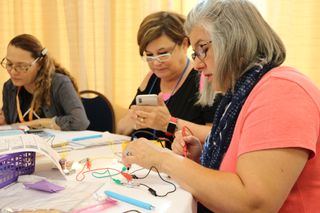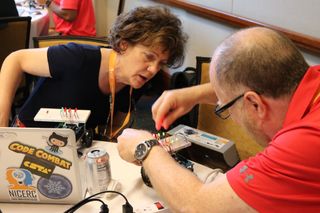District leaders consider cybersecurity their No. 1 technology priority, with 69% saying they are proactive or very proactive in this area. However, only 18% have a full-time staffer dedicated to cybersecurity according to CoSN’s latest edtech leadership report. Cyberattacks against education institutions continue to increase as student and school data present an attractive target for cyber criminals.
Less than half of K-12 students receive any education about cybersecurity, which is surprising since the issue is a priority for districts and the cybersecurity workforce shortage is considered a national security weakness by the U.S. government. Districts have an opportunity to raise the level of awareness about the need for strong cybersecurity with educators and students while teaching valuable and transferable skills.
“We need to invest in K-12 education and introduce students to the knowledge, skills, and capabilities around cybersecurity if we want to have a long-term, disciplined approach to closing the cybersecurity workforce gap,” said Kevin Nolten, academic outreach director for the nonprofit CYBER.ORG.
Working under a grant from the Department of Homeland Security, CYBER.ORG provides a no-cost professional development, curriculum, and resources for teachers who want to integrate cybersecurity lessons into their classrooms. By teaching cybersecurity concepts, teachers can help shape students’ confidence to succeed in the future workplace. Cybersecurity skills can also be integrated into content areas, such as math, science, and ELA, that are already aligned to learning standards.
“For example, there’s been a cyber-attack on the nation’s power grid. The lights are out and we need light to investigate the problem,” says Nolten. This scenario is the context for teaching a lesson on series circuits and parallel circuits–a concept required by academic standards. “By creating a real-world scenario, relevant to the content, we begin engaging students within their math, English, and/or science classroom.”
Even if students don’t move into cyber careers, what they learn and having awareness can create opportunities for employment as technology plays a role in all industries now.
Professional development for teachers

CYBER.ORG partners with the Louisiana Tech University’s Science and Technology Center in the College of Education to offer an online Cyber Education Certificate program for K-12 educators and administrators.
The organization’s goal is not to supplant any district’s existing curriculum but to complement existing content with its free digital courses. Courses include cybersecurity, computer science, advanced math, physics, engineering, and robotics.
During the PD workshops, teachers are guided through the curriculum as if they were students. Teachers experience projects through hands-on activities such as programming a robot to navigate a maze using sensors, programming a device to send an encrypted message, and building an enigma machine out of a piece of paper and a round chip can, just to name a few.
After receiving training:
- 93% of teachers said the program was effective in promoting student achievement.
- 92% of teachers said the program was effective at helping students understand cyber career pathways.
- 84% of teachers found the program effective in promoting interest in STEM and cyber.
More than 21,000 educators have received training or use resources from CYBER.ORG, and it has impacted 3 million students so far.
CYBER.ORG has also reached out to develop relationships with state departments of education to recognize the IT demands that districts have and to work together to solve those challenges through teacher PD.
Bottom line for Nolten and his colleagues is the belief that if we do not invest in quality education programs, our future—even our country—will be hurt. “It’s our responsibility to ensure our next generation workforce has the knowledge, skill, and ability to protect ourselves in cyberspace,” says Nolten.

